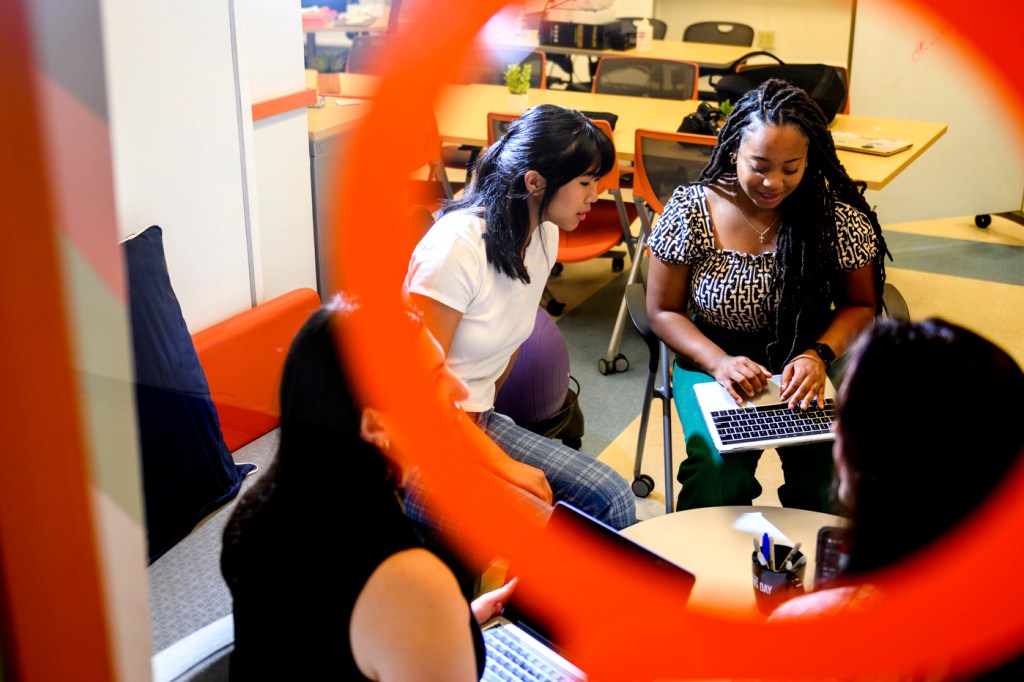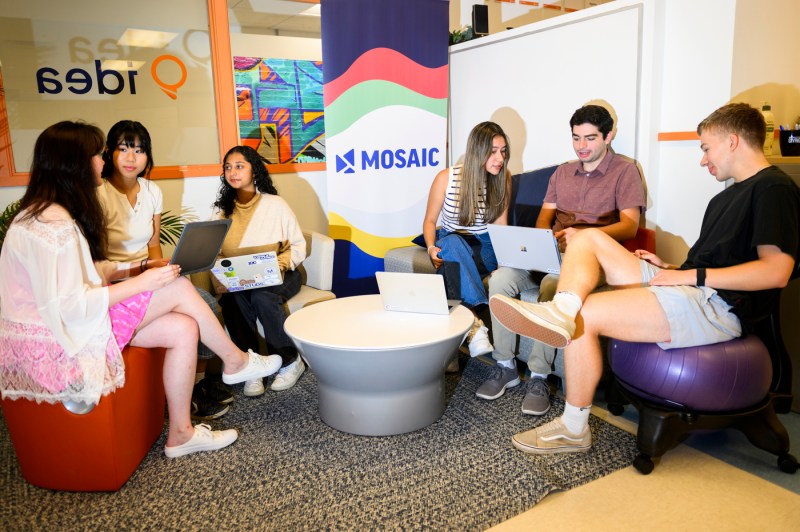Mosaic alliance connects entrepreneurial organizations to help Northeastern students launch their own businesses

Tutoring changed the course of Andrew Shenouda’s academic career.
The junior computer science and business major at Northeastern University struggled to read until third grade when extra assistance helped bring him to the top of his class.
When he got to high school, he wanted to unlock that same potential in other students. He started a nonprofit tutoring service with over 20 tutors. In the end, he fell into the same pitfall many businesses fall into: The administrative side of things took more time than the actual tutoring.

Shenouda came to Northeastern in fall 2020 with a dream of building a business, perhaps one that could help solve problems like the one he faced during his previous endeavor. That’s how he ended up joining a business pitching competition held by the Entrepreneur’s Club, the largest student-led organization on campus. His idea placed third.
“Doing that pitching competition put me in the shoes of someone who felt like they were the real deal,” Shenouda says. “It gave me the confidence necessary to push myself and try to bring the idea to life.”
Shenouda’s venture, Tadpole, a platform that allows tutors to manage the administrative side of their business, has now raised $30,000 in grants and is about six months away from onboarding users. It’s also an example of how Northeastern’s entrepreneurial organizations under the Mosaic umbrella can help bring the ideas of aspiring founders to life.
“At each stage in the chain of my journey to building a business, whether it’s ideation or product development or actually getting to the point where I’m trying to sell to customers … there was some sort of Northeastern organization to help and a lot of those organizations were under the Mosaic umbrella,” he says. “I didn’t even realize Northeastern had the resources it did and I was pleasantly surprised at a bunch of different levels.”
Mosaic was conceived as a way to unite Northeastern’s various entrepreneurial student organizations, many of which were often working on the same ventures at the same time. It started around seven years ago with three student groups and 30 students. Today, 11 student-led organizations comprise it, with 400 students in leadership roles and 500 ventures getting support from them, affecting over 3,000 Northeastern students and community members.
“Mosaic is kind of the hub of all student-led entrepreneurship organizations here at Northeastern,” explains Tyler Farley, Mosaic program manager and D’Amore-McKim School of Business graduate. “Every group that’s in Mosaic either directly supports (entrepreneurial) ventures through acceleration or consulting work.”
The organizations in Mosaic have a range of offerings from networking opportunities to connecting entrepreneurs with investors and venture capital firms. They also offer more technical assistance. Generate, a student-led product development studio, provides hardware and software development to clients.
Ryan Lonkart, a fourth-year computer engineering student and executive director of Generate, says the studio takes on eight to nine clients each semester. The work goes beyond just writing code: The group recently built a prototype of an automated date slicer for a snack company.
“We are here to be this support network for those who might not come from an engineering background,” Lonkart says. “We exist to help advance those ventures that are looking for a bit of technical development in their work.”
However, the benefits go both ways. While students help entrepreneurs craft a business, they’re also building their own skills.
“It’s an amazing resource, and it’s also experiential learning,” Farley says. “I’ve seen tons of students get co-ops and full-time jobs solely because of their experience in Mosaic because they’re actually building a prototype or designing packaging for a venture in their time outside class.”
Many of the student leaders of Mosaic organizations are entrepreneurs themselves, so they know firsthand how daunting it can be to launch a business. However, these organizations not only offer support but make the prospect of launching a venture seem more achievable, says Izabella Pivo, IDEA CEO and third-year business and communications major.
“The startup space can seem very competitive,” she says. “Imposter syndrome is so common and we feel like we are the only ones going through it. It’s important to have a community that you can go to to get feedback to talk about similar issues you’re facing. You could be working in completely different sectors, but you can always find that common thread. At IDEA and Mosaic, you’re able to meet people with that belief in themselves and that are looking to help everybody else succeed.”
Mosaic’s presence has spread beyond Boston. Last fall, the London campus launched Northeastern’s Young Entrepreneurs, which falls under the Mosaic umbrella. NYE puts on programs to develop students’ entrepreneurial skills and introduce them to what entrepreneurship looks like across different industries. Piranas Jeyanthan, a student leader at NYE, says the group applied to join Mosaic as soon as they launched in order to collaborate with the other student organizations under the umbrella.
“We give students the ability to see what entrepreneurship is truly like in the U.K. and the ability to network with a variety of entrepreneurs and small businesses,” Jeyanthan added. “We also allow them to develop key skills that are essential for a successful startup but are also transferable to other industries, careers.”
The Oakland campus is also opening its own chapter of The Entrepreneurs Club this fall, Farley says.
Any student is welcome to join one of Mosaic’s organizations, even if they’re not studying business. Farley says the gathering of students across disciplines is one of Mosaic’s most valuable assets.
“What’s really impactful for entrepreneurs everywhere is being in interdisciplinary settings,” he says. “It’s helpful when someone out of Bouve College of Health Sciences gets to sit with law and business students. When all those different perspectives get in the same room, folks end up learning a lot more.”
It can also bring clarity to students on their career path. Fifth-year industrial engineering student Sari Finn never planned on pursuing business, but she’s now wrapping up her time at Northeastern as the co-director of WISE (Women’s Interdisciplinary Society for Entrepreneurship) and doing a co-op at the Sherman Center that allows her to focus on developing her business (a faith-based app called Joyvine) full time.
Finn originally planned to pursue engineering, but getting involved in WISE made her realize building her own business was possible. Her goal is now to work for herself by 2031.
“WISE was my own personal introduction into just believing that I too can (be an entrepreneur,” she says. “Through being so heavily involved within the WISE and Mosaic ecosystem, I have realized … I can build something and lead a group of women and non-binary folks who are also helping others build something.”
Mosaic is hosting two events for students interested in getting involved. The Entrepreneurship and Innovation Fair will be held on the Library Quad from 12 to 4 p.m. on Sept. 13. There will also be an Entrepreneurship and Innovation Kick Off Event in EXP from 6 to 8 p.m. on Sept. 27.
Erin Kayata is a Northeastern Global News reporter. Email her at e.kayata@northeastern.edu. Follow her on Twitter @erin_kayata.





